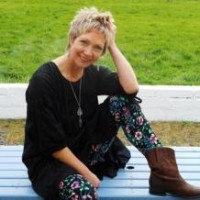“I know this sounds rude, but I can’t be in touch with you any more. I hope you understand.”
This is what I woke up to the other morning in my inbox—an old friend deciding he couldn’t risk our friendship in light of his marital troubles.
At first I was accepting and understanding. Yes, of course that was alright. He needed to tend to his primary relationship, and if that meant building a wall between us, that was fine. But as time slipped by, I realized that I felt immensely sad at what, to me, appeared an unnecessary loss. What could have been a beautiful friendship had been sacrificed on the altar of fear—fear of being honest, fear that had triggered jealousy, fear of stepping out of the comfort zone.
It made me reflect on how often we lose out on living a full life because of old wounds and fear.
As others of my generation are doing, I’ve been coming into my Chiron return this year, astrologically speaking. Chiron, the wounded healer, has been a significant archetype in my life from early on, way before I was conscious of what it meant or of how I was embodying it. And part of me had been looking forward to seeing how the completion of a full cycle of Chiron in my life might express itself. But I have to confess, another part of me had also been slightly nervous.
Would unresolved issues sneak up and grab me from behind? Would I succumb to some debilitating illness?
As is often the way with major astrological transits, it has been nothing like what I expected; although, as usual, perhaps I could have guessed what would be in store for me. What has been in my face, more than anything else during this period, is the difficulty of holding a “healed” place in a world of pain.
As I write those words, I’m aware that this is part of my projection onto the world—that it does a disservice both to me and to the world to see it as a place of pain. After all, the Shaman talk about the vital importance of dreaming our world into being, and all new ideas start as just that: concepts, thought forms, pure energy. How I perceive the world is helping to create it.
But I also know I’m not alone in finding it hard to hold a vision of a “healed” world when it appears so far from integrated, accepting and joyful. While I strongly believe in the possibility of world peace, unity and the happy co-existence of diversity, I also accept that pain, sorrow and disconnection are part of the human experience and are likely to continue to be until we, collectively, realize that there are other ways.
I’m not only seeing the international and political upheavals on the world stage; I am also experiencing the same core issues playing out at a deeply intimate level around me. Friends and acquaintances are coming face to face with their own deepest fears—physical illness, death, loss of home, breakdown of relationships, emptiness that comes from lack of purpose—with a corresponding retreat into old patterns and responses. Walls are going up, standard medical approaches reverted to, old lifestyles reentered.
Each has the opportunity to choose a new way of responding when faced with fear, but when push comes to shove and fear is triggered, few are willing to stray off the beaten path—even if the beaten path has been shown to be far from wholesome.
Keeping the faith seems to be the most difficult thing to do when fear kicks in.
And it has been interesting for me to observe my own response. One of my core fears is being rejected for my beliefs, and when that fear is triggered I, too, lose faith in a world that will accept me. I return to my old pattern of keeping my mouth shut, retreating into myself and away from those who might scorn my beliefs. I build my own walls—of silence and distance—in order to keep hurt at bay.
A wall is a wall, though, whether of bricks, law or silence. It keeps us safe, for a while, and has a temporary purpose in allowing us space to deal with issues, but it also keeps us divided, away from the possibility of shared understanding and growth.
It also keeps us away from love.
Being born a fortunate one in this world, I have always been aware that I don’t carry many of the wounds that bind people together. Pain is such a common way of bonding in society that we frequently don’t even notice it. And when it is noticed, resentment at those who have escaped pain is often the response. Emotional trauma, health issues, stress, fear—and our responses to them in the form of alcohol abuse, unhealthy eating habits, zoning out, abdicating responsibility—are often the glue that cements both intimate and casual connections.
If we choose not to engage, it can leave us on the outside. Healthier and happier, perhaps, but still on the margins.
For those who hold the intention of walking a more positive path, it can be difficult to both find common ground with others and avoid getting sucked into the common negative paradigms that surround us.
So what do we do? Do we keep quiet and mind our own business? Do we evangelically throw ourselves into saving the planet? How do we find a way of connecting with others that allows us to hold a “healed” view of the world without dismissing the pain that others feel?
And how do we keep faith in the possibility of a healthy world when all external evidence appears to be to the contrary?
For me, this is very much a work in progress. And isn’t that what life is about? It’s easy to say “just focus your thoughts” or “keep visioning,” and yet it can be so difficult to put this into daily practice. But there are a few practical things that help me keep faith:
Retreat.
Yes, retreat is always a necessary part of life, the yin to balance the yang. Our direct connection with our soul maintains our clarity and is our anchor when there is a storm brewing around us. Meditation, yoga, time spent in nature, creative pursuits, listening to music—whatever works to restore our soulfulness can serve as our retreat. But we can also retreat into playfulness and adventure, putting all the seriousness of life away for a while to lift the spirits, returning to child-like wonder, innocence and fun.
Community.
Those of us walking a less-worn path—or exploring entirely uncharted territories—rarely come with a ready-made community. In terms of geography, we can often be physically isolated from kindred spirits. But one of the gifts of social media and internet is the connection it gives to a wider virtual community that can reassure us that we are not entirely alone. Tapping in on a regular basis keeps us connected to a world of like-minded folk. Even better when we can make that a physical community to share space with, once in a while.
Disengaging.
Whether we like it or not, we are all part of a number of communities—families, peer groups, work associates, neighborhoods, even media networks. On the healthy side, there is variety and stimulation around us, as well as companionship. We have folk to share interests and entertainment with, to challenge our way of seeing the world and to trigger our self-awareness. However, less healthily, there are communities whose energetics revolve around fear and discrimination. We have a choice to remain tuned in and connected to these, or to withdraw our attention and energy.
Spirituality.
Some of us have strong connections in the spirit world that we can tap into—connections that keep our deeper love and understanding alive despite all that is happening in the world. Without it, we are caught in the perspective that what is playing out in the world is the only reality. With it, we have the sense that our “space suit” is only borrowed; we understand that this reality is but one of many and, as such, a temporary blessing to be appreciated for all it can offer.
Shifting Perspective.
What reality are we most tuned into? There is the violent, discriminating world of fundamentalism and extremism, permanently on our news feeds at the moment. There is the creative, innovative world of scientists, artists and explorers. There is the natural world of mountains, deserts, seas. There is the extra-terrestrial world. And there are the infinite perspectives on these many realities that come through each of our unique vantage points. If one isn’t working for us—that is, if it isn’t supporting a worldview that is helpful rather than hurtful—we have the choice to try another perspective.
Love.
I could quote John Lennon and a host of other dreamers here, but I will simply say I believe that with more love there would be less fear in the world. Whatever we can do to increase the share of love we feel, day by day, is the best medicine for all of us—humans, furred, feathered, stone, earth and star brothers and sisters. As Neale Donald Walsch suggests, at each moment we can ask, “What would love do now?” and aim to live as close to the answer as we can.
Self-Expression.
When we have retreated, communed, dreamed, played with perspective and fed our ability to love, many of us still feel the need to bring our perspective out into the world—not necessarily because we feel it is the right one, but simply because self-expression is a fundamental human need. Practicing a few phrases with which to softly but firmly counteract perspectives we don’t share builds our confidence, fluency and experience. And using creative skills—painting, sculpture, fiction, poetry, music—can express alternative truths in subtler ways.
But, when all is said and done, I need to keep reminding myself that this experience is my path, just as the experiences that others are living through are theirs. Ultimately, I must walk a path of wholeness in this lifetime.
If that is your need and choice too, then we have common ground. If it is not, then may your path serve your soul well in whatever form it takes.
~
Author: Freya Watson
Image: Samantha/Flickr
Editor: Toby Israel
~








Read 0 comments and reply